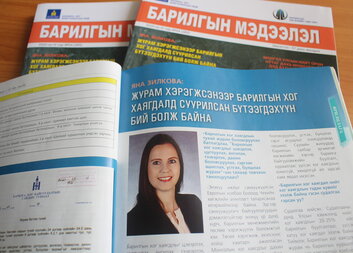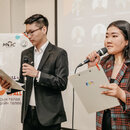The Caritas Czech Republic (CCR) in Mongolia is excited to share with you the news on the approval of the Procedure on Construction Demolition Waste (CDW) management under the European Union-funded project “Improving resource-efficiency and cleaner production in the Mongolian construction sector through materials recovery”. An interview about newly approved "Procedure for cleaning, collecting, sorting, transporting, recycling, reusing, disposing of, and burying construction waste" published in the Construction information magazine by the Construction development center.
Jana Zilkova, Country Director of Caritas Czech Republic INGO
Brief introduction of CD: Jana Žilková is the Country Director of Caritas Czech Republic in Mongolia. She has more than 10 years of experience in international development, project management, policy making and research. She has studied and worked in several European and Asian countries, including the Czech Republic, Belgium, Germany, Denmark, Singapore and currently Mongolia.
- First of all, we would like to express our gratitude on the approval of the Procedure on CDW management to you and your team behalf of our readers and workers on the Construction and waste sectors. Can you briefly introduce this Procedure with a title of "Procedure on cleaning, collecting, segregating, transporting, recycling, recovering, disposing and landfilling"
Thank you. I would like to express our gratitude to our donors, including the European Union and Czech Development Agency. Without their support, it would not be possible to implement the project and achieve its results. Furthermore, I would like to thank our partners and stakeholders, Mongolian National Recycling Association (MNRA), Mongolian University of Science and Technology (MUST), Delft University of Technology in the Netherlands (TUD), Ministry of Construction and Urban Development, Ministry of Environment and Tourism, Ulaanbaatar City Governance office and dozens of other state agencies, NGOs, private companies and individuals who have attended our meetings and training sessions and who have been a part of this project since its beginning.
The Procedure will enable to monitor Law on Waste and better manage construction and demolition waste (CDW) in Mongolia. CDW represents 20-25% of overall waste in Mongolia. As the construction and demolition sectors have been rapidly expanding, the amount of CDW has been uncontrollably increasing as well. Therefore, the procedure aims to regulate CDW, reduce the negative impact of CDW on environment and health, strengthen circular economy, promote sustainable production and consumption and improve waste management.
- What is the benefits of this procedure implementation in the sectors?
The construction and demolitions sectors as well as waste management in Mongolia will greatly benefit from the procedures. As a result, CDW will be separated and its amount will decrease, new methods and technologies to reduce and recycle CDW will be introduced and knowledge of staff in the construction and demolition sectors will improve. CDW will be properly classified and separated into several groups, including recyclable waste such as plastic, paper, wood, etc. Furthermore, the procedure will improve the transportation of CDW and encourage companies and individuals to reuse and recycle. Last but not least, the procedure will clearly indicate who is responsible for CDW and what will happen when CDW is dumped and not handled in accordance with respective laws.
- What are the other main results of your project “Improving Resource-Efficiency and Cleaner Production in the Mongolian Construction Sector through Materials Recovery”?
The project has already achieved most of its results. Moreover, I can honestly say that it has overachieved some of its expected results, in particular the number of trained experts in the construction sector and the number of awareness-raising activities. More than 400 representatives from the construction sector have been trained on sustainable CDW management and thousands have been reached through our public campaign to raise awareness on CDW. Together with our partners we have developed a new curriculum for CDW management that will be taught at MUST and published several papers and studies (Baseline study on the current situation regarding CDW management, Training handbooks, Research report on new CDW-bases product, Study on public awareness of CDW-based products, Economic feasibility to verify the profitability of CDW-based product, Report on existing legal framework and others). Moreover, MUST Research team has developed the first CDW-based product in Mongolia and we are currently working on the approval of standards for this product.
- What are the future plans of CCR in Mongolia?
CCR will continue its work and build up on the achievements in circular economy and environmental issues, including waste management and recycling. We will soon start a new project on sustainable plastics recycling that aims to promote sustainable production and consumption patterns and behavior in Mongolia though raising awareness of the principles of 3Rs (reduce, re-use and recycle). More specifically, the project will enable recycling SMEs to have a better access to plastic waste through efficient plastic waste collection, sorting and classification system; to enable recycling SMEs to have appropriate advanced equipment and technologies, to increase the number of their customers and to create conditions for scale-up and replication of the project. All the activities will be implemented on 3 different levels: city (Ulaanbaatar), province (Bulgan Aimag) and soum (Khishig-Undur soum).
Moreover, CCR has started a new project ‘All for YOUth, YOUth for All’ to enhance youth CSOs’ capacities to contribute to governance and development process in Mongolia through capacity building, networking, advocacy and research. More specifically, the project aims to enhance NGO capacities to empower youth, improve youth employment, increasing youth civic engagement and strengthen volunteerism among youth. Both above mentioned project will be co-funded by the European Union. We are excited to continue in our years-long work as well as implement new projects and cooperate with new stakeholders.





